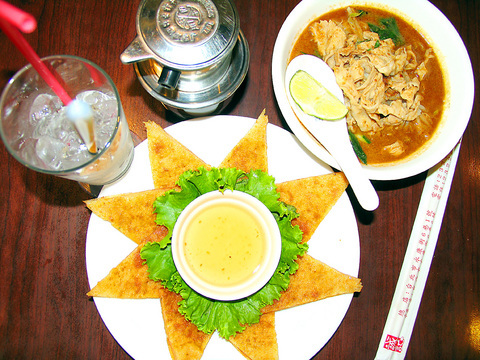"The best Vietnamese noodles in town" have kept the crowds coming back to Thanh Ky on Yongkang Street for 25 years and the family business is more popular than ever. You have to queue for a place on the weekend when families visit and office workers keep it busy throughout the week.
They usually come for the pho, one of Vietnam's most delicious exports. It's a broth made of cracked beef bones, steeped in herbs, vegetables and a special fish sauce. Meat and noodles are added toward the end of the cooking process and a slice of lemon tops it all off with a little zest.
"Our family secret is the seasoning," says Steven Tu (杜與方), the second-generation manager whose Vietnam-born father Tu Han-chen (杜漢琛) came to Taiwan when the communists took over. "My Dad is the master behind the dishes. He loves eating. It's his hobby and his greatest pleasure, so he's full of ideas."

PHOTO: JULES QUARTLY, TAIPEI TIMES
Immersion in the family business and a graduate course in hotel management and catering at a London university have obviously paid off for Tu Junior, who took over the day-to-day running of Thanh Ky three years ago and has made it one of the best-run joints in town. The fundamentals (good food, hygiene and service) are not difficult in theory, but in practice most restaurants find them difficult to keep up.
Asked for his management philosophy, the 30-year-old insisted he is still learning his trade but listed three ideas. "Value for money comes first. Cleanliness is essential and maintenance is most important. Also, keep the staff happy because they do most of the work."
Even so, midweek at lunchtime Tu was found in the kitchen keeping an eye on the pho broth. "I do all the jobs that need to be done because you have to keep an eye on things to keep in good shape. I even do the dishwashing. You can tell from the leftovers whether the food is good and what is popular and what is not."
Though the pho is justifiably the biggest draw at Thanh Ky there are plenty of other items on the menu to activate the taste buds, including starters such as Thai style shrimp cakes and a Vietnamese variant of the traditional hot pot. Traditional desserts such as jackfruit with coconut milk and a coffee percolated Vietnamese style round off the meal perfectly.
What you get at Thanh Ky is not fancy and the decoration is nothing special, just white walls livened up by bright ceramic pictures of typical rural Vietnamese scenes. The tables have faux wooden formica tops and the orange-uniformed staff is efficient rather than solicitous. But this is a first-class restaurant and will be around for many more years to come. A high-end diner planned for next year should also be worth waiting for.

June 23 to June 29 After capturing the walled city of Hsinchu on June 22, 1895, the Japanese hoped to quickly push south and seize control of Taiwan’s entire west coast — but their advance was stalled for more than a month. Not only did local Hakka fighters continue to cause them headaches, resistance forces even attempted to retake the city three times. “We had planned to occupy Anping (Tainan) and Takao (Kaohsiung) as soon as possible, but ever since we took Hsinchu, nearby bandits proclaiming to be ‘righteous people’ (義民) have been destroying train tracks and electrical cables, and gathering in villages

Swooping low over the banks of a Nile River tributary, an aid flight run by retired American military officers released a stream of food-stuffed sacks over a town emptied by fighting in South Sudan, a country wracked by conflict. Last week’s air drop was the latest in a controversial development — private contracting firms led by former US intelligence officers and military veterans delivering aid to some of the world’s deadliest conflict zones, in operations organized with governments that are combatants in the conflicts. The moves are roiling the global aid community, which warns of a more militarized, politicized and profit-seeking trend

The wide-screen spectacle of Formula One gets a gleaming, rip-roaring workout in Joseph Kosinski’s F1, a fine-tuned machine of a movie that, in its most riveting racing scenes, approaches a kind of high-speed splendor. Kosinski, who last endeavored to put moviegoers in the seat of a fighter jet in Top Gun: Maverick, has moved to the open cockpits of Formula One with much the same affection, if not outright need, for speed. A lot of the same team is back. Jerry Bruckheimer produces. Ehren Kruger, a co-writer on Maverick, takes sole credit here. Hans Zimmer, a co-composer previously, supplies the thumping

Dr. Y. Tony Yang, Associate Dean of Health Policy and Population Science at George Washington University, argued last week in a piece for the Taipei Times about former president Ma Ying-jeou (馬英九) leading a student delegation to the People’s Republic of China (PRC) that, “The real question is not whether Ma’s visit helps or hurts Taiwan — it is why Taiwan lacks a sophisticated, multi-track approach to one of the most complex geopolitical relationships in the world” (“Ma’s Visit, DPP’s Blind Spot,” June 18, page 8). Yang contends that the Democratic Progressive Party (DPP) has a blind spot: “By treating any